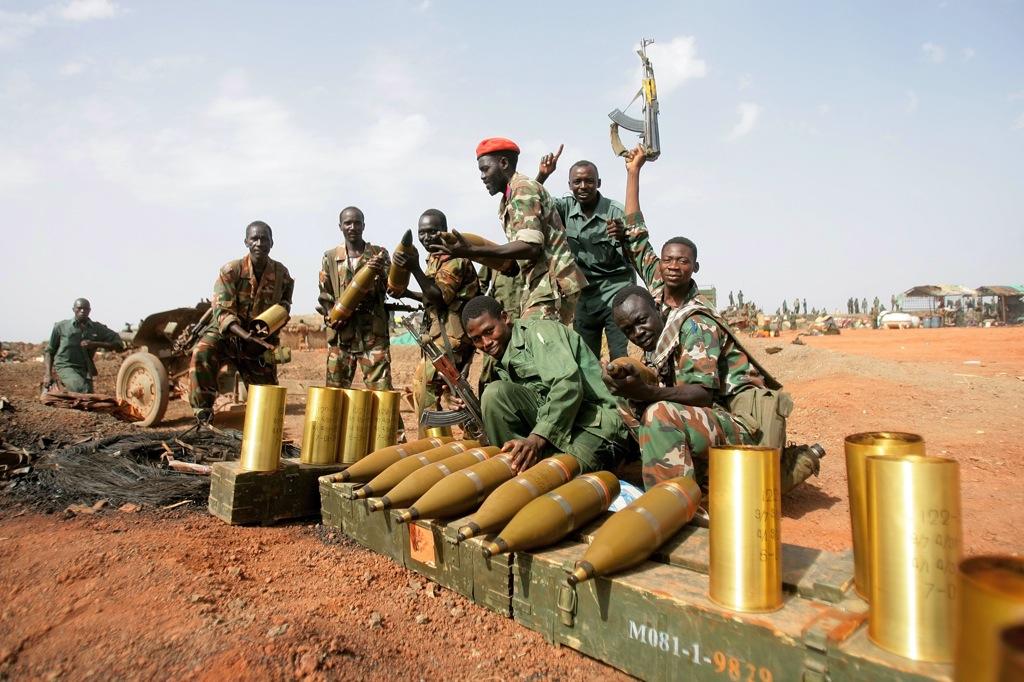Sudan and South Sudan: Conflict continues
Sudanese soldiers pose next to seized mortar rounds from the Sudanese Peoples Liberation Army (SPLA) of South Sudan in the oil region of Heglig on April 23, 2012. Sudanese President Omar al-Bashir said during his visit to Heglig that there will be no more talks with South Sudan after weeks of border fighting in contested regions and tension between the two states.
BENTIU, South Sudan — Sudan bombed a civilian market here today killing three people, highlighting the continued tensions.
Sudan claims that it is retaliating for South Sudan's shelling of the town of Talodi in Sudan on Sunday, which caused many casualties.
Sudanese President Omar al-Bashir said Monday that he is not interested in negotiating with South Sudan. He said the only way to deal with South Sudan is to fight, according to the BBC.
More from GlobalPost: Sudan President Bashir visits contested border town of Heglig
It is clear that South Sudan's withdrawal from Sudan's Heglig oilfield over the weekend has not ended the hostilities between the two neighboring countries, said South Sudan's Vice President Riek Machar.
“Our history is a history of fighting each other. The Republic of South Sudan was created out of self-defence,” said Machar, on relations with its northern neighbor Sudan. “We fight, and we talk.”
Machar sat beneath a large mango tree on the bank of the Naam River where he held court perched on a pair of flimsy baby blue plastic chairs stacked on top of each other for extra strength: He’s a big man.
He’s also a Big Man: He wears a heavy gold Rolex watch and a candy-striped shirt with chunky black and gold cufflinks. The fingers interlinked over his large belly sport gold rings. I recognize the distinctive gap between his front teeth before I recognize the rest of his face.
On the matching plastic table in front of him are three touchscreen smartphones, a couple of maps and a sketch of the area around Heglig oil field where a brief, bloody border war was fought this month. On Friday, South Sudan ordered its troops to withdraw, but few here think the war is over.
“The conflict is there, it hasn’t gone away,” says Machar. He was flanked by his wife Angelina Teny, a serious political player in her own right; the Minister of Defence John Koang Nyuon; and the Governor of Unity State, Taban Deng Gai.
“There is no ceasefire. We can return to Heglig at any time if [President Omar al-] Bashir attacks our forces.” He seemed convinced Bashir would continue to order attacks on the south. Governor Gai complained that Sudan is continuing its aerial bombardment of South Sudanese territory.
A few miles north of Bentiu were four craters left by an Antonov bombing late on Friday night that killed at least one soldier and wounded three more in the Unity oil field.
Machar insisted that it was diplomatic not military pressure that resulted in South Sudan’s capitulation.
“We withdrew from Heglig because of the UN Security Council, the African Union and US positions and the threat of sanctions,” he said. “We cannot afford sanctions against us. We cannot afford to be a pariah when we are not even a year old.”
The world welcomed South Sudan when it won independence on July 9 last year, but a series of tricky issues were left unresolved, including revenue and debt sharing, border demarcation and citizenship. These are the points over which both Sudans are arguing now.
Unlike Sudan under Bashir, for whom international opprobrium has become common currency, South Sudan does not want the blows to its economy and reputation that will come with international sanctions.
In January, as negotiations between Juba and Khartoum reached what — at the time — seemed their nadir, South Sudan cut off oil production, strangling both economies. Its seizure of Heglig on April 9 made matters even more serious as that oilfield alone provided more than half of Khartoum’s remaining oil revenues. That is why Bashir could not afford for its occupation by the South to go unchallenged.
Machar wasn’t worried that the oil shutdown would make fighting a war with the north economically impossible.
“We can sustain running our country without the extravaganza of oil revenues for quite some time,” he said. “We fought for over 40 years with very little resources and we managed to create a state.”
According to Machar the last southern troops pulled out of Heglig at nine on Friday night and moved back to Teshwin, a border settlement which, like so many others along the disputed boundary, doubles as a garrison. By then the Heglig oil field was in flames and buildings and possessions looted.
